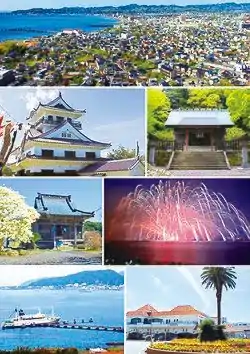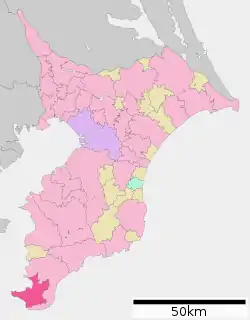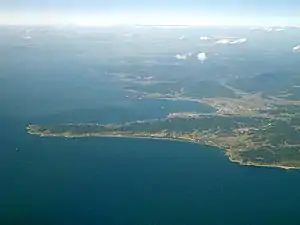Tateyama, Chiba
Tateyama (館山市, Tateyama-shi) is a city located in Chiba Prefecture, Japan. As of 1 November 2020, the city had an estimated population of 44,865 in 20,558 households and a population density of 410 persons per km2.[3] The total area of the city is 110.05 square kilometres (42.49 sq mi).
Tateyama
館山市 | |||||||||
|---|---|---|---|---|---|---|---|---|---|

| |||||||||
 Flag  Seal | |||||||||
 Location of Tateyama in Chiba Prefecture | |||||||||
 Tateyama | |||||||||
| Coordinates: 34°59′47.7″N 139°52′11.9″E | |||||||||
| Country | Japan | ||||||||
| Region | Kantō | ||||||||
| Prefecture | Chiba | ||||||||
| Area | |||||||||
| • Total | 110.05 km2 (42.49 sq mi) | ||||||||
| Population (November 1, 2020)[2] | |||||||||
| • Total | 44,865 | ||||||||
| • Density | 410/km2 (1,100/sq mi) | ||||||||
| Time zone | UTC+9 (Japan Standard Time) | ||||||||
| Phone number | 0470-22-3111 | ||||||||
| Address | 1145-1 Hōjō, Tateyama-shi, Chiba-ken 294-8601 | ||||||||
| Climate | Cfa | ||||||||
| Website | Official website | ||||||||
| Symbols | |||||||||
| Tree | Camellia | ||||||||


Geography
Tateyama is located at the far southern tip of the Bōsō Peninsula, facing the Pacific Ocean to the east and south, and the entrance to Tokyo Bay on the west. It is about 70 kilometers from the prefectural capital at Chiba, and within 70 to 80 kilometers from central Tokyo.
Climate
Tateyama has a humid subtropical climate (Köppen Cfa) characterized by warm summers and cool winters with light to no snowfall. The average annual temperature in Tateyama is 16.2 °C (61.2 °F). The average annual rainfall is 1,845.9 mm (72.67 in) with October as the wettest month. The temperatures are highest on average in August, at around 26.7 °C (80.1 °F), and lowest in January, at around 6.4 °C (43.5 °F).[4]
| Climate data for Tateyama (1991−2020 normals, extremes 1968−present) | |||||||||||||
|---|---|---|---|---|---|---|---|---|---|---|---|---|---|
| Month | Jan | Feb | Mar | Apr | May | Jun | Jul | Aug | Sep | Oct | Nov | Dec | Year |
| Record high °C (°F) | 23.2 (73.8) |
22.7 (72.9) |
24.9 (76.8) |
26.4 (79.5) |
29.7 (85.5) |
34.2 (93.6) |
36.3 (97.3) |
36.6 (97.9) |
34.5 (94.1) |
30.9 (87.6) |
26.2 (79.2) |
23.7 (74.7) |
36.6 (97.9) |
| Average high °C (°F) | 11.3 (52.3) |
11.9 (53.4) |
14.6 (58.3) |
19.0 (66.2) |
22.8 (73.0) |
25.2 (77.4) |
28.9 (84.0) |
30.8 (87.4) |
27.8 (82.0) |
23.0 (73.4) |
18.4 (65.1) |
13.9 (57.0) |
20.6 (69.1) |
| Daily mean °C (°F) | 6.4 (43.5) |
7.0 (44.6) |
10.1 (50.2) |
14.5 (58.1) |
18.5 (65.3) |
21.5 (70.7) |
25.2 (77.4) |
26.7 (80.1) |
23.7 (74.7) |
18.6 (65.5) |
13.7 (56.7) |
8.9 (48.0) |
16.2 (61.2) |
| Average low °C (°F) | 1.2 (34.2) |
1.8 (35.2) |
5.1 (41.2) |
9.7 (49.5) |
14.5 (58.1) |
18.4 (65.1) |
22.4 (72.3) |
23.7 (74.7) |
20.3 (68.5) |
14.6 (58.3) |
8.9 (48.0) |
3.8 (38.8) |
12.0 (53.7) |
| Record low °C (°F) | −6.7 (19.9) |
−6.5 (20.3) |
−5.7 (21.7) |
−1.2 (29.8) |
4.3 (39.7) |
8.5 (47.3) |
9.3 (48.7) |
15.2 (59.4) |
10.0 (50.0) |
4.0 (39.2) |
−1.5 (29.3) |
−6.4 (20.5) |
−6.7 (19.9) |
| Average precipitation mm (inches) | 85.9 (3.38) |
81.9 (3.22) |
160.9 (6.33) |
155.7 (6.13) |
153.2 (6.03) |
211.5 (8.33) |
179.2 (7.06) |
103.4 (4.07) |
222.0 (8.74) |
257.5 (10.14) |
143.5 (5.65) |
91.2 (3.59) |
1,845.9 (72.67) |
| Average snowfall cm (inches) | trace | 1 (0.4) |
0 (0) |
0 (0) |
0 (0) |
0 (0) |
0 (0) |
0 (0) |
0 (0) |
0 (0) |
0 (0) |
0 (0) |
1 (0.4) |
| Average precipitation days (≥ 1.0 mm) | 6.4 | 6.7 | 10.7 | 10.1 | 9.8 | 11.7 | 8.9 | 6.2 | 10.8 | 11.2 | 9.2 | 6.9 | 108.6 |
| Average snowy days (≥ 1 cm) | 0.1 | 0.2 | 0 | 0 | 0 | 0 | 0 | 0 | 0 | 0 | 0 | 0 | 0.3 |
| Average relative humidity (%) | 63 | 64 | 68 | 73 | 77 | 83 | 84 | 82 | 81 | 78 | 74 | 67 | 75 |
| Mean monthly sunshine hours | 176.8 | 155.2 | 164.5 | 179.1 | 185.0 | 135.3 | 179.2 | 216.2 | 152.5 | 137.0 | 146.5 | 164.0 | 1,991.7 |
| Source: Japan Meteorological Agency[5][4] | |||||||||||||
Demographics
Per Japanese census data,[6] the population of Tateyama has declined in recent decades.
| Year | Pop. | ±% |
|---|---|---|
| 1920 | 45,657 | — |
| 1930 | 48,145 | +5.4% |
| 1940 | 46,542 | −3.3% |
| 1950 | 59,424 | +27.7% |
| 1960 | 57,643 | −3.0% |
| 1970 | 55,236 | −4.2% |
| 1980 | 56,257 | +1.8% |
| 1990 | 54,575 | −3.0% |
| 2000 | 51,412 | −5.8% |
| 2010 | 49,290 | −4.1% |
| 2020 | 45,153 | −8.4% |
History
The area of present-day Tateyama was part of ancient Awa Province, dominated by the Satomi clan during the Sengoku period, who ruled from Tateyama Castle. After the Edo period, most of the territory was part of the feudal domain of Tateyama Domain (館山藩, Tateyama-han). After the start of the Meiji period, Tateyama Town (in Awa District), Chiba Prefecture was proclaimed on April 1, 1889 with the creation of the modern municipalities system. Tateyama annexed neighboring Toyosu Village on April 1, 1914, and merged with Hōjō Town to form Tateyamahōjō Town on April 18, 1933.
The city of Tateyama was proclaimed on November 3, 1939, with the merger of Tateyamahōjō with Nago and Funagata towns. The city was a base for the Imperial Japanese Navy Air Service until the end of World War II. Tateyama expanded on May 3, 1954 by annexing six surrounding villages.
Government
Tateyama has a mayor-council form of government with a directly elected mayor and a unicameral city council of 18 members. Tateyama contributes one member to the Chiba Prefectural Assembly. In terms of national politics, the city is part of Chiba 12th district of the lower house of the Diet of Japan.
Economy
The economy of Tateyama is based on commercial fishing, horticulture and summer tourism. The population of Tateyama surges during much of the summer. Tateyama is a popular destination for vacationing due to its proximity to Tokyo and its reputation as a "beach" or "surf town". There are numerous resort and holiday hotels dotting the coastline. Every August, tens of thousands of people gather on Hōjō Beach for the annual fireworks display.
Education
Tateyama has ten public elementary schools and three public middle schools operated by the city government, and three public high schools operated by the Chiba Prefectural Board of Education. The prefecture also operates four special education school for the handicapped. The National Tateyama Maritime Poly-technical School is located in Tateyama.
Transportation
Airport
- JMSDF Tateyama Air Base (no civilian traffic)
Sister city relations
 Bellingham, Washington, United States (Sister City since 1958) [7]
Bellingham, Washington, United States (Sister City since 1958) [7].svg.png.webp) Port Stephens, Australia (Friendship Cities from 1999 to 2009, sister cities since 2009)[8][9]
Port Stephens, Australia (Friendship Cities from 1999 to 2009, sister cities since 2009)[8][9] Fuefuki, Yamanashi, since May 1973
Fuefuki, Yamanashi, since May 1973
Local attractions
- Tateyama Castle, reconstructed in 1982
- Tateyama Municipal Museum[10]
- Nagisanoeki Tateyama, a branch of the city museum with materials from the former Chiba Prefectural Awa Museum[11]
- Nambo Paradise Botanical Garden
- Awa Shrine, a Shinto shrine
- Kannon Hall of Daifuku-ji, a Buddhist temple
- Nago-dera, a Buddhist temple
- Monument to Comfort women, Ōga District[12]
Notable people
- Tetsurō Sagawa, actor, voice actor
- Toshi, musician
- Yoshiki, musician
- Ryota Ozawa, actor
- Taira Uematsu (born 1983), coach for the San Francisco Giants, first-ever Japanese coach in Major League Baseball
In popular culture
The popular television drama Beach Boys, which originally aired on Japanese television in the summer of 1997, although with a plot set in the Shōnan region, was filmed largely in Tateyama.
Notes
- "館山市基本データ" (in Japanese). Tateyama City. Retrieved 2019-10-16.
- "令和元年度(平成31年度)月別人口" (in Japanese). Tateyama City. Retrieved 2019-10-16.
- "Tateyama city official statistics" (in Japanese). Japan.
- 気象庁 / 平年値(年・月ごとの値). JMA. Retrieved April 3, 2022.
- 観測史上1~10位の値(年間を通じての値). JMA. Retrieved April 3, 2022.
- Tateyama population statistics
- Bellingham Sister Cities Association,
- "Port Stephens sister cities". www.portstephens.nsw.gov.au. Retrieved 2018-01-17.
- "Port Stephens Sister Cities". Port Stephens Council. Archived from the original on 27 September 2007. Retrieved 13 July 2007.
- Tateyama Municipal Museum main building, Tateyama Castle Archived 2011-08-15 at the Wayback Machine
- 渚の駅・たてやま:展望デッキや体験施設、完成 /千葉 Archived 2012-07-29 at archive.today(in Japanese)
- Rekishi Kyōikusha Kyōgikai, ed. (2007). 石碑と銅像で読む近代日本の戦争 [Reading Japan's Modern Wars by Stone Memorials and Bronze Statues] (in Japanese). Tōkyō: Kōbunken. p. 31. ISBN 9784874983959. LCCN 2008409077. OCLC 212863804.
External links
- Official Website (in Japanese)